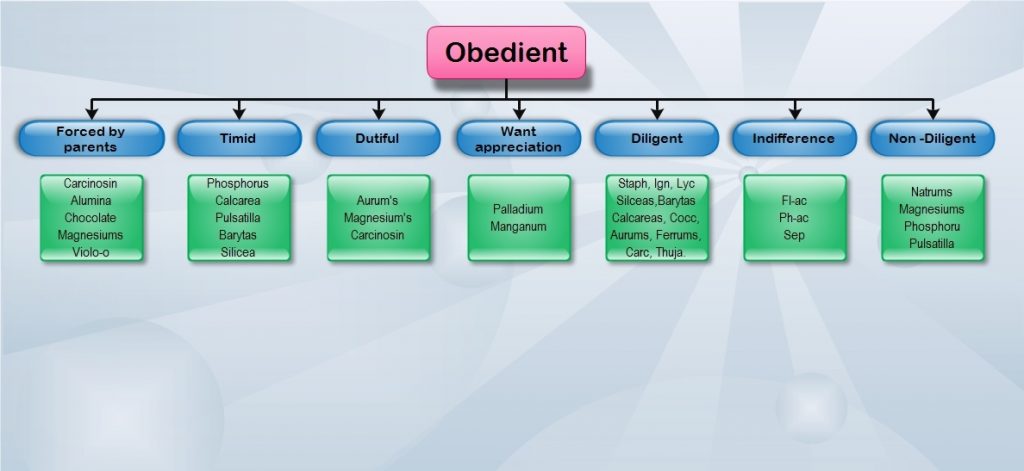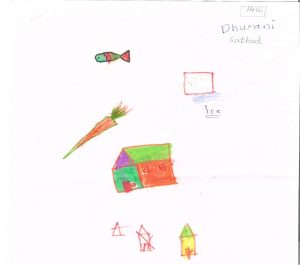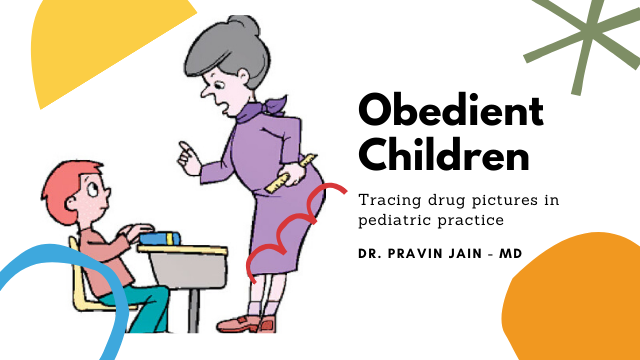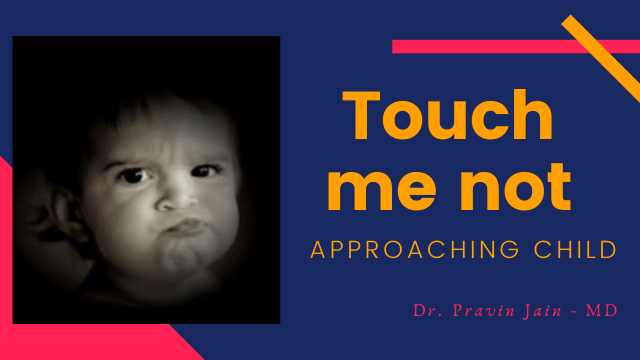Obedient Children in Pediatric Practice
Obedience means doing, or willing to do, what you have been told to do by someone in authority. It is often associated with submissiveness. Every parent wants their child to be obedient, and hence they are seen always instructing the child. Obedient children will often comply with the orders of the parents. They are afraid of being rejected or abandoned, that is why they put aside their own wishes and needs while doing what others want.
Expressions of obedience
- Infants when told ‘no’ will stop doing what they are doing.
- Toddlers will roam in the clinic but only close to their mother.
- Toddlers will keep the toys back in place.
- Preschool and school children will not talk much and will sit quietly in the waiting room. If offered chocolates will look at mother and then only accept.
- Well behaved children.
Obedient Remedies
2 alum, 2 bar-m, 1 calc, 1 calc-sil, 2 cocc, 3 CARC, 1 croc, 2 ferr, 2 ferr-i, 2 ign, 2 lyc, 2 nat-m, 1 ph-ac, 3 PHOS, 2 puls, 1 sep, 2 sil, 3 STAPH, 2 thuj,
These can be further classified according to the reasons why they are obedient.
- Forced by parents
- Timid
- Dutiful
- Diligent
- Indifferent
- Sensitive

Forced by parents
Due to the pressure from parents who are always seen instructing the child to do this and not to do that, the child is then pressurized and develops the state of alumina or carcinosin. The main difference between both is that alumina becomes confused and loses his identity. He fails intellectually and does not score good marks. He is not good at calculations and weak in mathematics. On the other hand carcinosin because of parental pressure adopts an adult-like attitude, they become mature early, become precocious. They become fastidious, perfectionist, and emotionally are very sensitive and intellectually very sharp and studious.
Alumina
Alumina is a ductile and malleable metal and can be easily rolled into thin sheets or thin wires. Similarly, alumina children can be easily molded by their parents. Alumina is a child who loses his identity due to parental pressure. He is basically a left-handed child who has been forced to be right-handed. Hence he loses his identity. Whatever the child does, the parents try to correct him and in the bargain, the child loses his identity.
Dhwani, a 7 yr old child, when came to the clinic was sitting next to her mother. Though there were many toys in the waiting room, she was sitting close to her mother. When we invited her to play with toys, she started removing one toy, played with it and then kept it back. Then she went on to play with second toy. Mother said Dhwani is very fastidious and she would also clean her study table. If she spills water while eating, she will clean it immediately. However on interrogation it was found that Dhwani’s mother was a perfectionist, and would want Dhwani to abide by table manners while eating. She would scold her if while eating she would spill food on the table. So Dhwani developed an attitude of fastidiousness but in true sense she was not fastidious as her books in the school bag were never kept properly. Dhwani’s mother complained that she takes a lot time to eat her food and is very slow in activities. In school Dhwani was an average child, and was very weak in Maths.

Drawing of Dhwani
1. No clear ideas. When asked to draw, she asked for a book to draw from and she copied whatever she drew from another book. (there was a book for kids explaining f – fish, i – ice, c – carrot, h– house)
2. Drawings were very small
3. Mistakes (She drew 3 houses which were wrong and then finally one which was correct)
Calcarea comes very close to alumina when you see a child who is slow in doing their work and for whom mathematics is the most difficult subject. But Alumina has dry skin and no perspiration whereas Calcarea has profuse perspiration.
Other characteristics of Alumina
- Withdrawing + Hyperactive
- Mathematics inept for
- Mistakes in writing and speaking
- Weak will
- Confusion of mind
- Thermals – Chilly
- Thirst – Thirsty
- Constipation with soft stools
Carcinosin
Carcinosin parents are very demanding and they want the best performance from their child in academics, sports, extracurricular activities. They are told to behave nicely in front of others and hence they finally break down and become precocious (mature too early) and take up early responsibilities. They are ‘Bonsais’ where their own individuality is not allowed to express. They behave nicely and in an obedient manner. Never express their desires. Their school bag will always be in perfect order, the books kept properly, and they always score good marks in exams. If they fail they feel very bad.
Carcinosin is very sentimental, sensitive to music, sensitive to reprimands. With artistic aptitude. They are very sympathetic and concerned about others. They are perfectionists, will keep all their things, toys, etc very nicely. It’s worthwhile to check the school bag of a carcinosin child. All the books and their covers will be in good condition and nicely kept. They are very precocious and will behave too mature for their age. They are perfectionists and hence even slightest of criticism about their work will hurt them the most. They will immediately start weeping and their weeping is non-expressive meaning inward weeping.
Other characteristics of Carcinosin
- Sensitive to reprimands
- Ailments from domination of others, a long history of
- Affection, children, craving for
- Ailments from too early responsibility
- Responsibility strong in children
- Fastidious
- Artistic Aptitude
- Sensitive to arts, drawing, literature
- Precocity
Drawing of Carcinosin
- Nature
- While coloring, the colors will not go out of objects drawn
Obedience because of Timidity
These are not truly obedient children but because of their timid and fearful nature, they will not go out to disturb the harmony of the clinic. They fear that the doctor might scold them so they will behave nicely. But whenever they get a chance they will behave in a rude manner. When given the toy to play, they might refuse it at first, but once they are reassured by parents, they will take the toy, and you can invariably see that they are not careful with the toy, and will not keep it back in place.
Pulsatilla
Pulsatilla children are very sweet looking (esp. females) and attract a lot of affection towards them. You feel like touching them but the moment you approach they will start weeping loudly. In the waiting room, the child will be constantly playing, talking loudly to self/mother but moving ONLY around the mother. She will not leave the mother even for a second, and if forced will start weeping loudly.
They always want to please others hence appear to be obedient and fastidious. But it is more for getting attention. If there is another child in the clinic, and if he tries to snatch a toy from Pulsatilla child, the child will refuse and will cry loudly. The mother then has to talk sweetly to the child, and convince her or flatter her and then only will the Pulsatilla child part with her toys. Otherwise, they are very selfish and will want all toys in the clinic for themselves, not allowing others to take them. In short, Pulsatilla obedience is more of a mildness but not diligence.
Pulsatillas is very manipulative to get attention. Will weep very easily when shouted at or reprimanded. However, the weeping of Pulsatilla is very superficial. If you console the child, he will immediately become quiet. If you try to make eye contact with Pulsatilla they will usually avoid eye contact and appear bashful. They will typically move and twist their body with both hands clenched tightly together. If you try to examine the child, they will not allow you to examine and will immediately cry. They will sit in the mother’s lap, but with face facing towards the mother’s chest, avoiding any eye contact with you. At the same time, they are very sweet and affectionate, but this affection is out of selfishness and they expect affection in return. A Pulsatilla child will be very clinging to mother, and will definitely ask the mother at least once a day whether she loves him or not (easy tendency to feel loneliness and forsaken). Will hug and kiss their mother without any reason.
Pulsatilla Infant
The infant is withdrawing. Weeping baby. Cries loudly in crowd or gathering. The infant when taken to a party will cry loudly and not be consoled by the mother. They have to take the baby out.
Want always to be carried, but wants to be carried slowly because it wants the touch of the mother more. They don’t want to be rocked. The moment the mother puts the child down he starts crying, and the mother needs to pick him up again. He seems close to cham., but the cham. cry and demand irritate the mother whereas the puls. cry evokes sympathy. (Kent says pulsatilla has pitiful cry and cham has a snarling cry, you will want to caress the one and spank the other)
Infants feel better when they are taken to the garden or in the open air. They like caressing and fondling, and will always be happy by kisses and cuddling.
Pulsatilla Toddler
The Pulsatilla toddler will remain clinging to the mother. They will be mama’s baby, following the mother everywhere. In the clinic, the child will sit in the mother’s lap. They want the safety and security of the mother. They will resort to thumb sucking to overcome their insecurity. They fear being left alone. Also, they have a fear of the dark.
Wants attention. If they are hurt slightly they will weep loudly and will show their injury (which is just a scratch) to everyone in the house to get their sympathy. If anything happens to the child they weep loudly to get attention.
They fear separation from parents and so they will not let the mother away from their sight.
Pulsatilla Schooling Child
The schooling child appears to be bashful and will not answer any of your questions. Instead, he will communicate all the things to the parents who will then communicate with you. They will speak in a soft tone (whispering) which is often difficult for you to hear. They make good eye contact with the doctor but from the mother’s lap.
Wants the attention and affection of all the family members. It can be manipulative to get affection and attention. Even though they grow old, they will want to sleep with their mother.
The Pulsatilla child is very easily bullied by her friends and will often come home weeping and complaining that she has been hit by them. (Often complain that they have been hit by younger children also)
Entry points
- The child lies with hands above head
- Sweats on one side of the body
Rule-out
If they avoid (don’t like) hugs and kisses
Calcarea Carb
Like Pulsatilla, even Calcarea will be playing around the mother, but it is not for love and affection from mother but more for security. They avoid going into unfamiliar surroundings, places that are new to them and hence will not venture out in the clinic to explore the toys kept. At home, parents say that he will listen to us and will not go outdoors to play. However, the reason is that they don’t want to go out to play sports like football which is an aggressive sport. They will prefer indoor games where there is less risk involved. They would rather prefer to watch other children playing from the balcony of the house.
Calcarea child is very much dependent on parents, and in the clinic will not answer all the questions directly to the doctor but will whisper the answer to the parents. They are very well behaved in the clinic. Their voice is too soft to be heard. They are not aggressive, and when another child snatches a toy from their hand, they will not resist but will go and pick up another toy.
Academically they are average but slow. They are weak in mathematics. They cannot handle too many things at a time. If you give them 3 tasks to complete they will take them up one by one. They will complete one task and then only shift to the second task. Will take their own time to complete homework.
Very sensitive and timid children with a lot of fears. They have lots of anxieties in them. They are very sensitive and cannot see any cruelties, horror movies, and get easily affected by them. If you shout at them they will immediately start weeping (like puls). They cannot see fighting movies or cartoons like Pokemon. But they would rather prefer cartoons like Disney world.
Calcarea Infant
- Will have anxious look when lifted from the cradle
- Scratches his head when aroused in the morning
- Profuse sweat – will wet the whole pillow
- Will play alone only if someone is around. Gets scared if the mother is not there in the room
- Will not sleep in the dark
Calcarea toddler
- Difficult dentition
- Timid, they will avoid risky, bullish game. Instead will seat at the corner and watch.
- Will sprain ankle easily
- Contented – sit around and do nothing.
- Cannot see fighting in movies, Cannot see horror movies
- Cartoons – Like Tom and jerry, rather than Pokemon
- Sensitive to rudeness and criticism
- Craving eggs
- Biting nails with forsaken feeling.
- Big-bellied child with emaciated limbs and emaciated neck.
Calcarea (Schooling)
- Withdrawing
- Fear they will be laughed at
- Even knowing answer, they will not answer in class, for fear of being laughed.
- He wants to read the bible all day.
- Curious – asks questions about metaphysical things in order to relieve his fears of life and death.
Physical Characteristics
Thermals: Chilly
Thirst: Thirsty
Desires icy cold things
Aversion to hot foods
Coarse and curly hair
Soft hands
Aggravation any type of exertion
Obedience because of Duty Consciousness and Diligence
Aurum
Aurum is a very well behaved and responsible child. In the clinic, it will be seen that they are usually taking care of other children playing. They will play very cautiously and will never break any toy. After finishing playing they will keep the toy back from where they took it. They will even instruct others to do the same.
The obedience of aurum comes from his strong sense of duty. They will sit quietly in the waiting room, preferring to read some books rather than play. At home, they will do all their work on their own and will never trouble parents to do their work.
The other theme of aurum is “Guilt”. They always feel that it was their mistake and that they are at fault. (In reality, this might not be the case). Abhiram, when he was 1 ½ yrs old, his father had some injury on the chest and had few stitches. When his father used to carry him, he and the wife used to caution Abhiram not to swing the legs as this might hurt him. Now when Abhiram is 3 yrs old, he feels that because of him the father got hurt and he feels bad about it (but this was not the case. The parents only cautioned him not to swing legs).
Schooling children are less talkative, more responsible. When a teacher assigns them a duty, they make it a point to do it. They are usually made monitors in the class. And if work is assigned to them, they will become very serious and take all the efforts to do it. They will not take it lightly.
Aurums are sensitive about their duties and responsibilities and are always on guard if they are failing in their duties. Reaction to this sensitivity is self-condemnation, self-reproach, and self-criticism. Feels he has done wrong, think he has neglected his duties.
Rule out Aurum if
- The child is talkative in school
- The Child expresses anger on others.
- The child is Non-diligent
Ignatia
Ignatias are usually good and obedient children. When they come in, they will avoid any confrontation and will sit nicely on the chair. They will be quiet (non-communicative), but very attentive, listening to everything that the mother is saying. They don’t laugh much and appear serious.
If you try to shout at them, they will feel hurt easily, but will not express their sadness by crying. (Puls. will weep loudly). You can see a small drop of tear in their eyes (nat-m. and staph.). They might show hysterical reactions like deep involuntary sighing. Staph. will have the feeling of anger within, they feel that when they have not done anything wrong, why are they being blamed. Staph. will clench their fists in anger. Ign. will try to hide their feelings as far as possible.
Ignatia schooling child will be very studious. They are hardworking, honest and good at studies. Will never cheat when they play games. After coming home from school, they will first complete their homework and then only watch TV. They like family-oriented dramas and movies and are easily moved to tears, but the tears never come out.
Ignatias usually fall ill after results, when they get fewer marks than expected in the exams. They get upset because though studied well they secured fewer marks than expected. They are upset with the result but don’t show their emotions to parents. Parents will only realize that they are upset when they develop fever or other acute complaints.
Ignatias are very sensitive. Sensitive to reprimands, criticism, reproaches. Easily hurt but will never express their feelings. Silently broods.
Staphysagria
Withdrawing with anger suppressed. Staph. is also having a good boy image Very well behaved in the clinic. But they are not assertive. They feel it’s useless to show their anger. If they are shouted at, they will not express their displeasure but will suppress it. It will be very obvious that they are angry, but will not express. They will close their fist tightly, but will not react.
The main theme of staph. is to maintain dignity.
Falak a 9 yr old schooling child behaved very obedient in the clinic. When the father was asked to describe his behaviour he said: “he behaves like a Britisher”. By which he meant that he would not mix easily with others and would not indulge in rubbish talks. He would speak to the point and say what is relevant to the topic. He doesn’t show his emotions easily. Controlled Emotions. Doesn’t show affection. He feels it but holds back. Tolerance level too high. Pent-up anger. If the barrier of his anger breaks, his reaction will be very lethal.
Staph. is very sensitive and touchy. When you shout at Staphysagrias, they become very angry, but will never express their anger.
Lycopodium
Cover-up is the theme of lycopodium. Always trying to show what he is not. Basically he is very timid and has a lack of confidence. But he tries to cover-up this by boasting, making big stories and showing that he is the best. “Hard to inferiors and soft to superiors”. A lycopodium child is obstinate and dominating at home, but has a different image – as an obedient boy in the school.
Rule-our if the child is fighting with seniors
Ferrum
Withdrawing + Hyperactive + anemic (Red cheeks – false plethora)
Chilly + Thirsty
Authority + Contradiction intolerant + Hypersensitivity to noise + Easily fatigued + gentle motion amelioration.
The main theme of Ferrum is ‘Firmness”. They are authoritarian.
Cyrus – 3 yr old child once told his maid to prepare bournvita for him. The maid was busy and hence she said that she will prepare it later. Cyrus very coolly said, “I want bournvita now means I want it now”. The maid had to give him bournvita. This is the authoritarian behaviour of Ferrums, which is quite distinct from obstinacy. Here the anger part is missing when they demand things. Whatever they say (instruction) has to be followed immediately.
Schooling children are very firm in their opinions. Once they are convinced about an idea, it is very difficult to change it, and they always feel they are right. They cannot stand the slightest contradiction. They love challenges and are positive and strong-willed in the execution of their duties. They are dominating and dictatorial.
Toddlers do not like much of physical activity. They get fatigued very easily.
Infants – Ferrum infants are very sensitive to the slightest noise. (Asar, bor, Kali-c). They do not like solid foods and want all the foods to be mashed and pureed. They cannot bite food. When the mother tries to force food to them, they become red very easily. They do not like to be rocked but are better by gentle motion.
Withdrawing
- Slightest contradiction aggravates. If anything does not happen as per their wish, they become irritable and angry. They cannot take no.
- Nervous
Hyperactive
- Sensitive to least noise. Slightest noise is intolerable. (crackling of paper, pressure cooker, etc)
- Hyperactivity is more at the mental level. Physically he is indolent (gets fatigued easily), but mentally easily excited.
Reaction
Anger – inhibited, anger intrapunitive.
He does not want to talk, does not want to work. He does not want anyone to talk to him. He even does not want the company of his best friends. Misanthropy.
Mind
Slightest contradiction aggravates.
Generals
Aversion to solid foods and dry foods.
Tough and thick hair.
Rule Out
- The child wants cradle to sleep.
- The child eats solid foods.
- The child sleeps in a noisy environment
Obedience but Non-Diligent
Natrum
The natrum child is well behaved and often mature beyond his years “like a little adult”. Nat-m is very similar to Ignatia, but the main feeling of nat-m. is that they feel they are being ridiculed by others. In the clinic, they will appear very obedient and well behaved, but do not like being talked about, and if the mother criticizes them, they feel very bad and hurt. Very sensitive emotionally. If you shout at a nat-m. child, he will feel very bad, but will not express his sadness. (nat-m. is less emotional than ign) Inside he feels that he deserves to be shouted at. He is not worthy. And later when you try to console him, they will go into aggravation and feel sadder and will start weeping (not loudly like pulsatilla). They are typically loners, will not mix easily with other children. They love indoor games and will usually love to play alone.
Nat-m will have one to one relationship. They will be attached to either of the parents.
Natrum Schooling Child
The natrum. schooling child appears to be very obedient. In the waiting room, he will not be roaming but will be obediently sitting in one place. Inside the clinic, he will be standing very close to his mother, looking down. If asked any question, he will look at the mother and then reply. His answers are short and abrupt.
Nat-m, puls, and Lyc are taking part in a dance show. And somehow they don’t perform well and fall down while performing. All 3 will react differently.
Puls will immediately start crying and will cry so loudly that the first reaction of the parent will be offering her consolation. Mother says “no problem child, don’t worry, it’s ok, you can perform better next time, don’t cry ……” and so on. After some time the puls child feels better.
Lyc will immediately stand up again and show off as if nothing has happened. He will say that it was not his fault. Actually the ground was slippery and he fell down. It was not my mistake. I’m a good dancer but the auditorium is not good. SO I fell down.
Nat-m will get up and will not talk to anyone and go backstage and weep. He will blame himself and feel that only if he had worked more harder this would not have happened. It is his mistake and carelessness that he fell down and has spoilt the name of the whole school.
Crocus
Crocus is very similar to Lachesis. But the maliciousness and deceitfulness of Lachesis is lacking. Whereas in Crocus sensitivity to music is more marked than Lachesis. They like to dance on music. Involuntary singing on hearing a single note sung.
Loquacity is similar to Lachesis and also jesting.
Hysterical remedy. Many alternating symptoms are PRESENT. At one time angry then suddenly become cheerful. One time sad then become cheerful and starts dancing.
He likes to kiss and hug.
Reaction – extrapunitive
Phosphorus
The Phosphorus will be a very approaching child making a good eye to eye contact, but there is always a fear element involved. If you shout at them loudly, they will immediately start crying. They will have fear of the soft toys of big animals kept in the clinic (like tub). Fear of the dark. They are very affectionate, will talk sweetly with you, and if anyone in the family is ill, they will take good care of them. They are good mannered children, who will behave very nicely in the clinic. They are affectionate because they want affection back. They like to be praised and if you praise them they feel very happy. Even nat-m, ign, staph will be good-mannered in the clinic, phosphorus is approaching, and will like to share their feelings with you, will express their symptom but others like nat-m, ign, and staph will not like to express their symptoms. Tuberculinum will also be very similar to phosphorus, but the Speed of tuberculinum patients will be very fast. Tub like fast things, like fast cars and they have a lot of fascination with cars. Pulsatilla also comes close to phosphorus, they both like consolation, but pulsatilla is selfish. Disposition of pulsatilla is weeping and the will avoid eye contact and are Bashful. Both like kissing and hugging, but phos will like from everyone, whereas puls will kiss and hug only his mother.
- Fear of Ghosts
- Affectionate
- Magnetized desire to be, and amel
- Sympathetic
Dr. Pravin Jain, a well known homeopathic pediatrician has understood the various basic disposition of the child and has produced numerous charts that helps in pediatric practice. The Remedies mentioned here are all taken from his book Essence of Pediatric Materia Medica.



